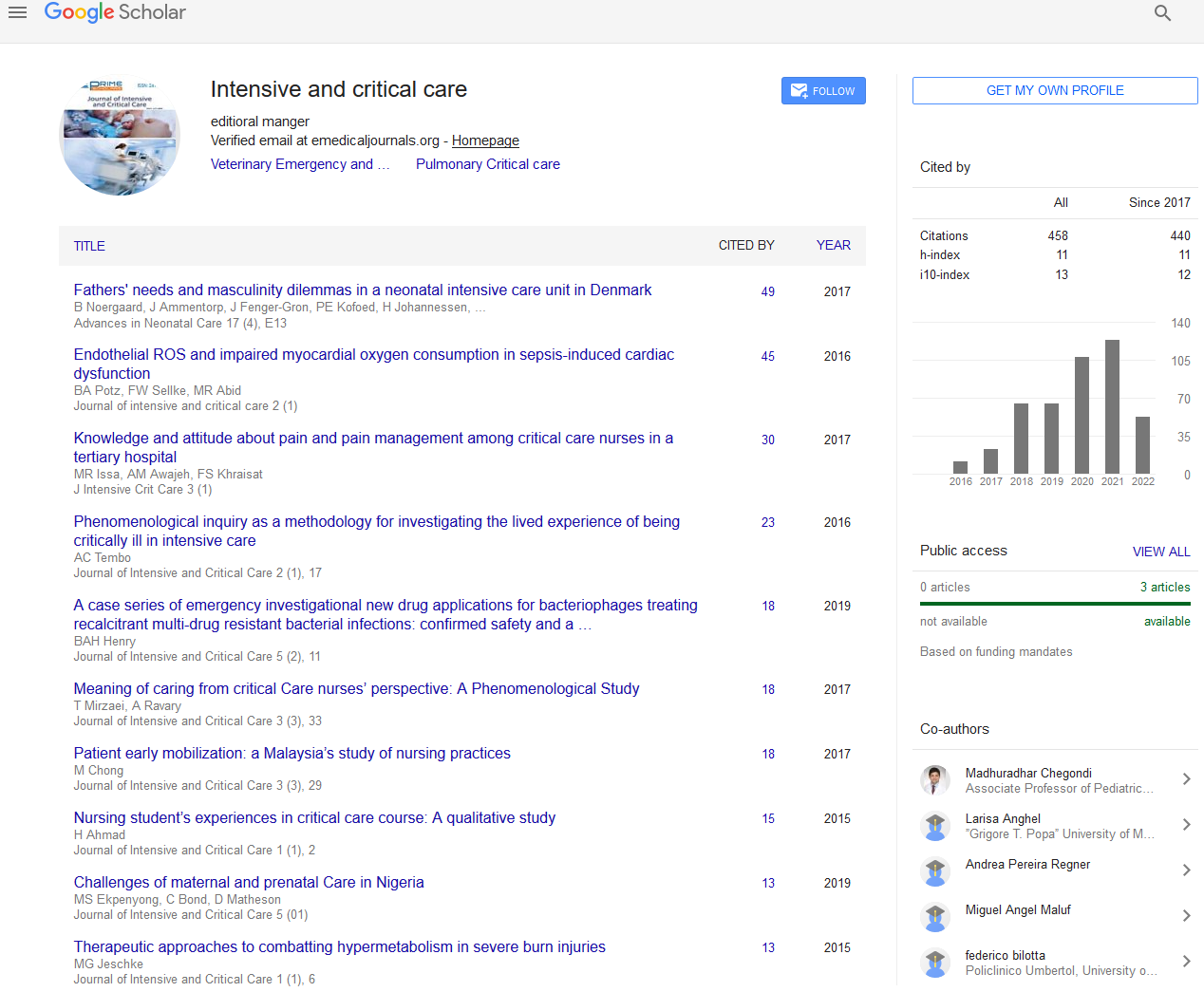Commentary - (2023) Volume 9, Issue 6
Surgical Intensivists as Mediators of End-of-life Questions in the Care of Critically Ill Patients
Thomas Bein*
Department of Anesthesia, University Hospital Regensburg, Germany
*Correspondence:
Thomas Bein,
Department of Anesthesia, University Hospital Regensburg,
Germany,
Email:
Received: 29-Nov-2023, Manuscript No. IPJICC-23-18685;
Editor assigned: 01-Dec-2023, Pre QC No. IPJICC-23-18685 (PQ);
Reviewed: 15-Dec-2023, QC No. IPJICC-23-18685;
Revised: 20-Dec-2023, Manuscript No. IPJICC-23-18685 (R);
Published:
27-Dec-2023, DOI: 10.35248/2471-8505-9.6.57
Description
Surgical critical care plays a pivotal role in the healthcare system,
providing essential support for patients who undergo
major surgical procedures or experience severe medical conditions.
These specialized units are designed to manage critical
cases and stabilize patients during the most vulnerable periods
of their recovery. While surgical critical care is undoubtedly
valuable, it is not without its drawbacks and challenges. This article
explores the drawbacks of surgical critical care, shedding
light on issues that the medical community needs to address to
improve patient outcomes and the overall healthcare system.
One of the most significant drawbacks of surgical critical care
is the high cost associated with it. The intensive monitoring,
specialized equipment, and highly trained staff contribute to
the financial burden on healthcare institutions and, ultimately,
patients. The exorbitant cost of surgical critical care can lead
to financial hardship for individuals and families, even when
they have health insurance. This financial strain can result in
delayed or inadequate care, negatively impacting patient outcomes.
Surgical critical care units are resource-intensive, requiring
a significant allocation of healthcare resources. This
allocation can create challenges for hospitals and healthcare
systems, especially when resources are limited. The competition
for resources can lead to delays in patient care and potentially
affect patients’ chances of survival. Moreover, resource
allocation issues can hinder the availability of critical care for
other patients in need. Overutilization of surgical critical care
services is another drawback. In some cases, patients who do
not necessarily require intensive care may be admitted to critical
care units due to limited bed availability in regular hospital
wards. This overutilization can lead to unnecessary strain on
critical care resources, resulting in suboptimal care for patients
who genuinely need it. It also drives up healthcare costs and
can expose patients to higher risks of healthcare-associated
infections. Surgical critical care units are hotspots for healthcare-
associated infections, as patients are often in a vulnerable
state with compromised immune systems. The close proximity
of patients, frequent invasive procedures, and prolonged hospital
stays increase the risk of infections such as ventilator-associated
pneumonia, central line-associated bloodstream infections,
and surgical site infections. These infections not only
prolong hospital stays but also carry a risk of increased morbidity
and mortality. Patients admitted to surgical critical care
units often face a challenging and traumatic experience. The
unfamiliar environment, constant monitoring, and the severity
of their condition can lead to psychological distress, anxiety,
and even post-traumatic stress disorder. Family members also
experience emotional distress as they witness their loved ones
in critical condition. The psychological and emotional impact
of surgical critical care can have long-lasting effects on patients
and their families. Surgical critical care requires healthcare professionals
to manage high-stress, high-stakes situations on a
daily basis. The emotional toll of dealing with critically ill patients,
complex decision-making, and unfavourable outcomes
can lead to physician burnout. Burnout not only affects the
well-being of healthcare providers but can also impact the quality
of care they deliver, potentially leading to medical errors
and patient safety issues. Surgical critical care often presents
healthcare providers with ethical dilemmas. Decisions regarding
the withdrawal or withholding of life-sustaining treatment,
organ allocation, and end-of-life care are frequently encountered
in these units.
Acknowledgement
None.
Conflict Of Interest
The author’s declared that they have no conflict of interest.
Citation: Bein T (2023) Surgical Intensivists as Mediators of End-of-life Questions in the Care of Critically Ill Patients. J Intensive Crit Care. 9:57.
Copyright: © 2023 Bein T. This is an open-access article distributed under the terms of the Creative Commons Attribution License, which permits unrestricted use, distribution, and reproduction in any medium, provided the original author and source are credited.

